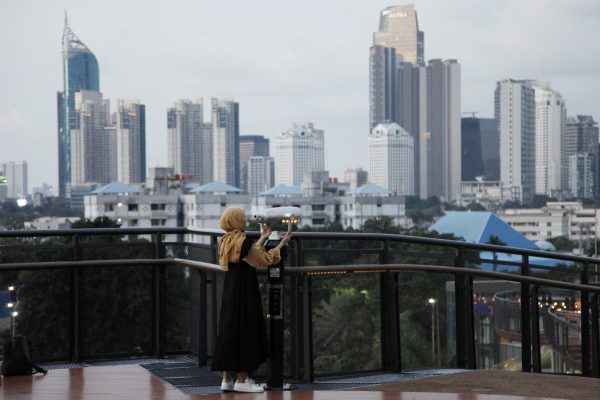Almost two years since its enactment, Indonesia’s Omnibus reforms seem to have boosted investment from both foreign and domestic sources. The stock of foreign investments in the 2021–22 financial year is around 21 per cent higher than the 2018–19 figure, while domestic investments have risen by around 41 per cent over the same period. These investments are still dominated by resources-based industries such as metal, mining, food and paper.
The non-traditional services sector, known as ‘other services’, stand out in Indonesia’s investment scheme. The non-traditional services sector includes trade, hotels, restaurants and real estate. The total foreign investment in this sector during the 2021–22 financial year was 117 per cent higher than that in 2018–19, while domestic investment was 260 per cent higher. Modern services, especially information technology (IT) services and consultancies, have driven the investment growth. Since the beginning of the COVID-19 pandemic, foreign investment in these industries amounted to around US$1.4 billion — almost five times its pre-COVID-19 level.
Two factors seem to have contributed to this impressive growth. The first is the emergence of digital industries in e-commerce, travel and finance. Some digital industries became unicorns during the COVID-19 pandemic. These unicorns and other IT-based firms have attracted much attention and investment from global venture capital.
The second factor is the incentives for services introduced by the Indonesian government. The Omnibus Law includes IT-related modern services such as e-commerce and programming, data processing and video games in a priority list and incentivises investors with tax allowance and tax holidays. Unsurprisingly, foreign investment grew triple digit after the regulation’s enactment.
But the Indonesian government excluded some modern services from the priority list. Business consultancies recorded an impressive foreign investment growth of around 120 per cent, from just below US$200 million in 2018–2019 to around US$440 million. The domestic demand for these services is significant and increasing, with total imports amounting to US$8.5 billion in 2021.
If business consultancies were included in the Omnibus Law priority list, the consulting industry’s investment could drive domestic contribution following the rise of other emerging sectors. Government incentives could also potentially increase Indonesia’s participation in the global value chain and diversify the economy from natural resources and traditional manufacturing sectors.
Among the countries in Southeast Asia, the Philippines stands out as a country that has successfully secured a position in the modern services industry. In 2019, the Philippines’ foreign income from IT and business process outsourcing (BPO) accounted for around US$24 billion. In comparison, Indonesia only made US$8 billion from this industry, while Singapore generated US$93 billion.
Modern services industries were more resilient to the pandemic than other sectors, as seen in the Philippines amid its tight COVID-19 restrictions. In 2021, the Philippines’ income from modern services industries increased to US$26 billion. In contrast, Indonesia’s more traditional tourism sector only generated US$600 million in 2021, a significant drop from US$17 billion in 2019. This was due to restrictions and travel bans.
Modern services industries are also promising in their potential to create jobs. The IT and BPO industries in the Philippines provide around 1.4 million jobs, more than half of which are mid-skilled jobs. This suggests ample employment opportunities for Indonesians if they enter similar industries.
Indonesia needs to meet some prerequisites for modern services industries before it can tap into the global market. The Indonesian government should include more modern services, such as business consultancies, in the priority industry list. The other modern services industries that should be on the list include computer consulting, digital platforms and other business supports. The Philippines’ government tax incentives for these industries have made the country one of the biggest players in the call centre industry.
Indonesia must also improve its digital environment. This includes upgrading its internet speeds, which are far slower than in peer countries. More importantly, Indonesia should enforce data protection laws, which are critical for modern services industries. The Personal Data Protection Bill was passed on 20 September 2022, ten years after a similar law passed in the Philippines.
Finally, Indonesia should invest in developing human capital in modern services sectors. The Philippines has emerged as a critical player in BPO industries because its labour force is proficient in English, the second best after Singapore in Asia. Around 25 per cent of the Philippines’ labour force has completed tertiary education. This is on par with Malaysia, although below Singapore. In Indonesia, only 10 per cent of its workforce is tertiary educated but this number still amounts to around 20 million young people who could participate in the modern services sector.
Indonesia’s participation in the modern services industries is relatively low despite the promising benefits this industry offers the country. The reform of the Omnibus Law has opened up an opportunity for Indonesia to tap into the global market, but more reforms are needed for Indonesia to be able to compete with other countries.
Sulistiyo Ardiyono is a PhD Candidate at the Crawford School of Public Policy, ANU.
Arianto A Patunru is Fellow at the Arndt-Corden Department of Economics, Crawford School of Public Policy, ANU.

